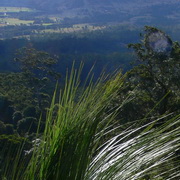Code of Practice for Ecotourism Operators
A number of accommodation operators in our region belong to Ecotourism Australia, (previoiusly the Ecotourism Association of Australia - EAA), which has responsibility for accrediting tourism operators under the Eco Certification Program (previously the National Ecotourism Accreditation Program (NEAP).
For those wanting a quick guide, the original EAA Code of Practice below, from 1994, provides a general starting point, while the current Eco Certification Program provides an extensive point by point, category by category list of "things to achieve", for accommodation, tour operators and nature guides.
If all you do is impliment these practices, you'll be well on the way to being a responsible and ecofriendly tourism and travel operator.
And while some of the points are now outdated, for example "distribution networks (e.g.catalogues)", and have been well and truly overtaken by most things digital, the primary objective remains the same. Get the word out!
In 1997 the EAA kindly provided permission for us to reproduce the original Code of Practice for Operators below, and also the Guidelines for Ecotourists.
1994 Code of Practice for Ecotourism Operators - Australia
- Strengthen the conservation effort for, and enhance the natural integrity of the places visited.
- Respect the sensitivities of other cultures.
- Be efficient in the use of natural resources (water, energy).
- Ensure waste disposal has minimal environmental and aesthetic impact
- Develop a recycling program.
- Support principals (i.e. hotels, carriers etc.) who have a conservation ethic.
- Keep abreast of current political and environmental issues, particularly of the local area.
- Network with other stakeholders (particularly those in the local area) to keep each other informed of developments and encourage the use of this Code of Practice.
- Endeavour to use distribution networks (e.g. catalogues*) and retail outlets to raise environmental awareness by distributing guidelines to consumers. (*See Social Media)
- Support ecotourism education/training for guides and managers.
- Employ tour guides well versed and respectful of local cultures and environments.
- Give clients appropriate verbal and written education (interpretation) and guidance with respect to the natural and cultural history of the areas visited.
- Use locally produced goods that benefit the local community, but do not buy goods made from threatened or endangered species.
- Never intentionally disturb or encourage the disturbance of wildlife or wildlife habitats.
- Keep vehicles to designated roads and tracks.
- Abide by the rules and regulations of natural areas.
- Commit to the principle of best practice.
- Comply with Australian Safety Standards.
- Ensure truth in advertising.
- Maximise the quality of experience for hosts and guests.
- Guidelines for Ecotourists (EAA 1994)
- 10 ways to tell if your eco-lodge is really eco! By Justin Francis, responsibletravel.com. "'Eco' and 'eco-lodges' have become buzzwords used by both terrific organisations dedicated to conservation and benefitting local people, and those seeking to exploit its marketing potential for economic gain with little or no regard for destinations." Without getting into the intracies of composting toilets, how can the tourist decide between the genuine and the not so genuine? 10 ways to tell if your eco-lodge is really an eco-lodge (rather than just 'greenwashing').
- Global Code of Ethics for Tourism: NEW. UNWTO. "As a fundamental frame of reference for responsible and sustainable tourism, the Global Code of Ethics for Tourism (GCET) is a comprehensive set of principles designed to guide key-players in tourism development. Addressed to governments, the travel industry, communities and tourists alike, it aims to help maximise the sector's benefits while minimising its potentially negative impact on the environment, cultural heritage and societies across the globe."
See also; Accreditation & Certification Programs and Codes of Conduct, Practice & Operational Guidelines

See Also:
Disclosure
The Big Volcano Ecotourism Resource Centre (ERC) provides content free of charge, so that visitors, residents, businesses, students and teachers can access our resources.
Our site also includes advertising and affiliate links to products and services that you can buy online (at no extra cost to you).
If you visit a web site via an ad link, or make a purchase via an affiliate link, we get a small cut of the revenue. (Thank you.) By doing this, you help us to continue to deliver these resources to you, for free.